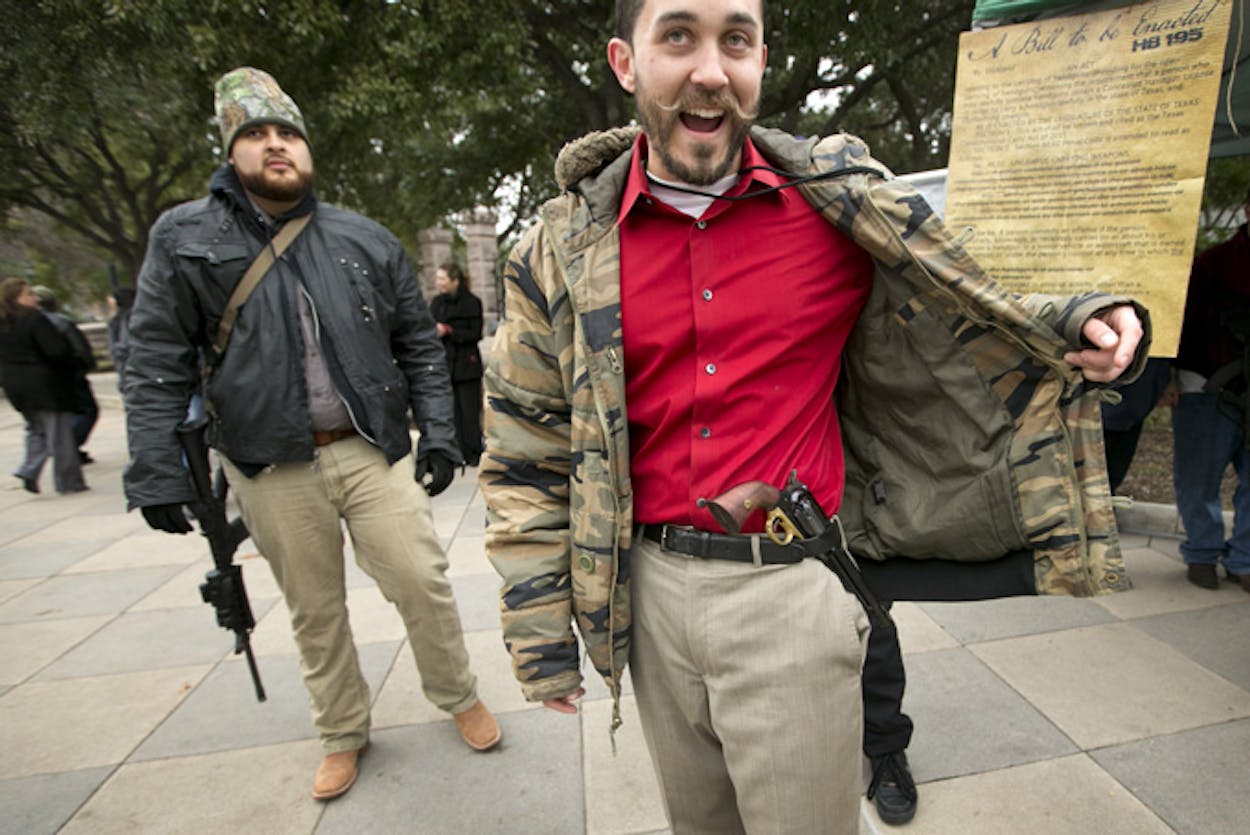Some of the most—if not the most—contentious topics in Texas politics are gun laws. Recently, both staunch advocates and staunch detractors have been glaring, screaming, politicking, and farting (really!) at one another from the picket lines. Though open carry is officially legal in Texas and campus carry goes into effect on August 1, the dust hasn’t quite settled. Apparently, most people are a little confused about the specifics.
Last week the Texas Senate Committee on State Affairs had a three hour legislative committee hearing to address these concerns with law enforcement, college chancellors, and lawyers in attendance. Namely, citizens aren’t crystal clear about where and when they are able to openly carry. During the hearing state Senator Jane Nelson, R-Flower Mound, said the biggest complaint received is uncertainty and confusion. “The more we can do to inform the public… the better it is for everyone.”
Essentially, open carry is legal in the same places that concealed carry is, but whether or not open carry is legal in churches or campuses when school isn’t in session, the specifics of bringing guns into businesses, and whether law enforcement or businesses can ask for a license are all still murky.
These problems have come up across the state in last month or so. Last week, a man at a Walmart in Devine was stopped by an employee and asked to show his handgun license. A polite argument (well, all things considered) ensued.
At Walmarts that sell booze, customers must show a firearm license when asked. This is a policy put in place by the corporation to help it comply with the Texas Alcoholic Beverage Commission, which prohibits unlicensed handguns in businesses that sell beer, wine, spirits, etc., for off the premises consumption. Elsewhere, HEB has banned open carry altogether, as well as Safeway and Whole Foods. Kroger, the country’s largest chain grocery store, has not.
But the problem extends beyond businesses. The legality of police officers requesting to see a hand gun license has also caused a stir. Kevin Laurence, executive director of the Texas Municipal Police Association, told the Waco Tribune that there is “a difference of opinion about whether or not just the mere fact that someone is walking down Main Street carrying a pistol in a holster is sufficient probable cause for a police officer to insist on seeing their handgun permit.” So now prosecutors and police chiefs in every county are left with the task of interpreting the law and enforcing it.
In other news, thanks to campus carry’s malleability and divisiveness, University of Texas System Chancellor William McRaven thinks it will end with some lawsuits. “We think it is likely that those rules will be subjected to legal challenges through lawsuits filed by persons on one side or the other of the debate,” McRaven said in his testimony at last week’s hearing.
The nature of campus carry grants private universities the choice to ban or allow guns on campuses at their own discretion. Public schools must allow guns on campuses. However, they are given the freedom to designate gun free zones, which McRaven predicts will lead to instances in which both proponents and opponents will find particular rules unreasonable.
All of this confusion is pretty unsurprising. The inalienable right that’s brought us to this hot topic, the Second Amendment, is one of the more confusing bits of our legal system. But here we are, two centuries later, and the Second Amendment’s legacy lives on through its great, great, great, great grandlaw, confusing the hell out of everyone that’s willing to admit it.






